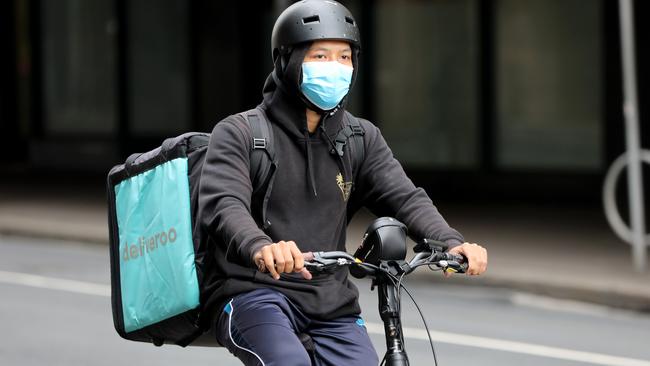Victorian state budget: What we know so far
Thousands of Victorians will soon have free access to financial advice and no-interest loans for the first time. Here's who will be eligible.
News
Don't miss out on the headlines from News. Followed categories will be added to My News.
Thousands of extra Victorians under money pressure will have free access to financial advice and no-interest loans for the first time under a revamped state government scheme to cut out payday loans and predatory practices.
The Andrews government’s budget will commit to a $14.6m expansion of the Good Money program, which has previously only operated out of storefronts in Collingwood, Dandenong, Geelong and Morwell.
The enhanced service is expected to deliver 11,500 no-interest loans over four years and help about 25,000 Victorians on low incomes.
For the first time since it was created, it will become a telephone and digital service that can be accessed across the state rather than only through face-to-face meetings.
The service will be designed and tested to become fully operational in 2022.
Good Money services include no-interest or low-interest loans, cheap insurance and budget advice. It was created to stop predatory payday lenders taking advantage of Victorians in trouble.
None of the loans or other products have hidden costs.
“Needing to buy a fridge or a new set of tyres shouldn’t ruin your finances — or your future,” Disability, Ageing Carers Minister Luke Donnellan said. “By delivering expanded Good Money services, we’ll help more Victorians access safe and fair support.
“As we recover from the pandemic and last year’s bushfires, the financial advice and services offered by Good Money are more important than ever for Victorians doing it tough.
“We’re expanding this program to include digital and phone services so Victorians in financial stress can get the support they need, no matter where they live.”

No-interest loans can be made available to those with a health care card, pension card or with an annual income of up to $45,000 for individuals and $60,000 for joint applicants.
The applicants must show a “willingness to repay” and would be eligible even with a bad credit history.
Loans usually run for between 12 and 18 months, with typical repayment of about $58 a fortnight, and can be used for necessary items such as white goods, furniture, cars and household repairs.
The state government funding will also help to continue Good Monday pop-up stores and other financial services for another 12 months in bushfire-affected parts of Victoria.
FOOD DELIVERY RIDERS GET A FAIR GO IN AUSTRALIAN FIRST
Food delivery riders and other “on-demand” workers could soon be given more rights and legally classified as employees for the first time, with the Andrews Government moving to reform the industry.
Treasurer Tim Pallas on Thursday announced the government would the 20 recommendations of an inquiry into the conduct around workers for companies like UberEats, Deliveroo and Menulog.
Pressure has been ramping up on governments to act as injuries and deaths for these riders have grown and reports have emerged of poor conditions.
Under the current system, riders are classified as contractors for these large companies and do not have access to the normal benefits of those people who are on a business’s payroll.
MenuLog was the first company to break rank on this policy last month by declaring it would treat it’s riders as employees.

A state government inquiry into the issue urged both levels of government to act, including for the Commonwealth to reform current laws around industrial relations.
The Andrews Government has agreed to work with the federal government on the issue but has also committed $5 million to investigate the problem on its own.
This will include working on new standards for the industry on employment status, safety, working conditions and pay.
A new agency to support these types workers will be investigated along with options to ensure companies like Uber and Deliveroo are more transparent.
About half of the changes recommended by the inquiry will depend on whether the federal government introduces its own laws, with Victoria potentially forced to go it alone.
The push is the first of its kind by an Australian state.
“All too often gig economy workers have found themselves in what looks and feels like an employment relationship,” Mr Pallas said.
“Every person deserves to feel safe and secure at work, especially gig workers who so many of us relied on throughout the pandemic.
“With a leadership vacuum in Canberra, Victoria will lead the way with more focused support for the on-demand workers and businesses who need.”
DRASTIC BID TO TURBO CHARGE COURTS
More judges and magistrates will be recruited under a $210 million packaged aimed at fixing Victoria’s court backlog crisis.
With about 200,000 cases currently pending, and wait times for criminal trials blown out by up to three years, it is feared it could take a decade for the justice system to recover.
But it is hoped the drastic government intervention, to be announced in next week’s state budget, will help clear the growing backlog.
Under the plan almost $100 million would be injected into the state’s online court system in a bid to fast track cases, including $40.9 million to expand the Online Magistrates Court.
A further $56.7 million would be direct to help the Victorian Civil and Administrative Tribunal transition more hearings online.
Four new County Court judges would be appointed early, ahead of upcoming retirements, to try and ease the load.
However it would not increase the overall number of judges in the long-term.
Another two magistrates would be added to the Online Magistrates Court and three judicial registrars to the Children’s Court.
Victoria Legal Aid, Victoria Police, the Office of Public Prosecutions and Corrections Victoria will also share in $55 million worth of new funding.
A bold proposal to convert unused CBD office space into temporary courtrooms to fast track cases is understood to have been rejected.
Attorney-General Jaclyn Symes said the coronavirus pandemic had showed that court services could be delivered differently.

“We want to see that continue, with more digital services delivering a faster and more flexible justice system for more Victorians,” she said.
“Courts and tribunals did a great job getting through the pandemic and they learnt a lot. Now they’ve told us what funding, resources and staff they need to drive down the resulting backlogs – and we have listened.
“This funding is about supporting innovative, agile responses to court backlogs – allowing our judicial officers to focus on what’s important.”
The cash injection adds to an $80 million package already directed at tackling the backlog crisis.
And it follows criticism by one of the state’s most senior judges, Supreme Court Justice Lex Lasry, that not enough had been done to ease the burden on the justice system.
Calling for urgent funding Justice Lasry warned alleged criminals facing serious charges would be released on bail because of delays in the system.
He made the comments while bailing a man facing serious drug trafficking charges, who had already breached bail, and admitted having “serious reservations” about doing so.
But citing the “inordinate” delay in bringing the matter to trial Justice Lasry said such a delay could be applicable in “almost every case”.
Under the state government plan $34.8 million would be used to boost court resources, and $22.9 million would go to improving caseload management.
It comes after the federal government spends an extra $100 million over four years to fast-track cases in courts clogged with custody and property disputes.
The Family Court will hire 10 more judges, with 27 extra registrars, 25 registrar-related support roles, 10 family consultants, four indigenous liaison officers and 10 associate positions for judges from July.
The Federal Circuit Court will also hire eight more judges.


